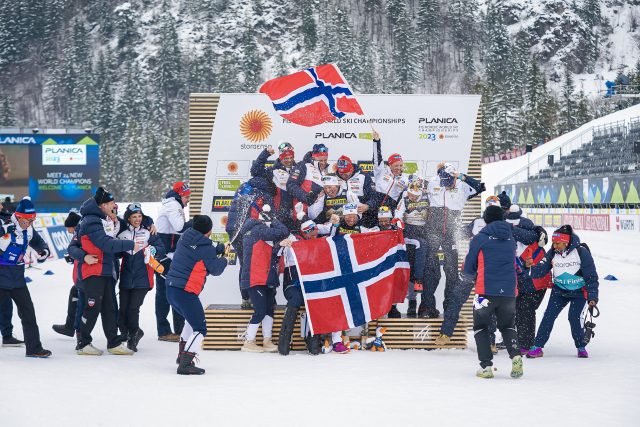 This World Cup coverage is made possible through the generous support of Marty and Kathy Hall and A Hall Mark of Excellence Award. To learn more about A Hall Mark of Excellence Award, or to learn how you can support FasterSkier’s coverage, please contact info@fasterskier.com.
This World Cup coverage is made possible through the generous support of Marty and Kathy Hall and A Hall Mark of Excellence Award. To learn more about A Hall Mark of Excellence Award, or to learn how you can support FasterSkier’s coverage, please contact info@fasterskier.com.
With the mounting success of the American women’s cross-country program, the one prize continuing to elude it has been a major championship relay medal. In some ways, it has become an obsession with team USA, an obsession they were looking to check off the list after today; however, the Americans were not the only country focused on the relays. Norway and Sweden are bitter rivals in relay events, and considerable national pride hangs in the balance each time the event is run. Norway has won five of the last six Women’s World Championship relays; even so, Norway would be seeking redemption after missing the podium in the last Olympics. Sweden has finished second to Norway in four of those five World Championship relays; Sweden is understandably tired of looking up on the podium at its Scandinavian neighbor. Germany would also be on a mission to prove that its Olympic silver medal was not a fluke.
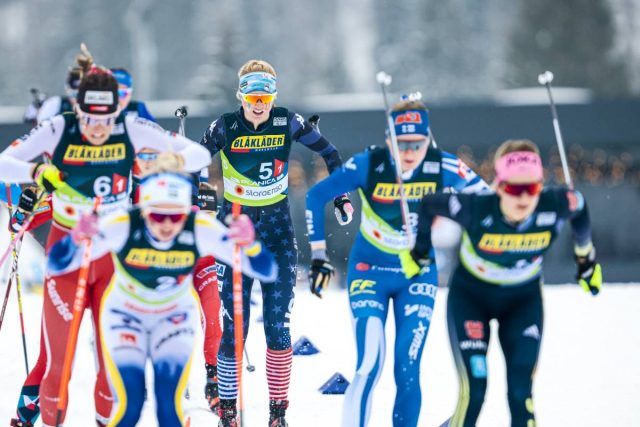
After the drama on the race had concluded, Norway had redeemed its national pride taking first place. Germany proved that it was for real by virtue of its second place finish. Sweden’s stars couldn’t match Norway’s and Germany’s intensity, and took home the bronze. Team USA simply could not keep pace with the world’s best teams and finished fifth. Team Canada skied to eighth place.
World Championship Women’s 4 x 5 Kilometer Relays
Hailey Swirbul took the leadoff leg for USA. One kilometer into the race, the field was still bunched together with Emma Ribom (SWE) setting the pace. At about 2.5 k, Ribom established a gap taking five skiers with her. Swirbul was in the second group; it was clear at times that her skis were slipping. “The team skied on hairy skis for the Classic leg,” said US.. coach, Chris Grover. “Klister was icing, kick wax wasn’t quite enough. Skiing hairies is a real art… if you haven’t had a lot of experience on that it can be a challenge. Hailey did great; she kept it close.”
Ribom continued to stretch the field, reducing the lead group to Sweden, Norway, Germany, and Finland. At 4.4 k, Weng sprinted into the lead setting a blistering pace that fractured the lead group providing Norway with a tiny lead at the first exchange.
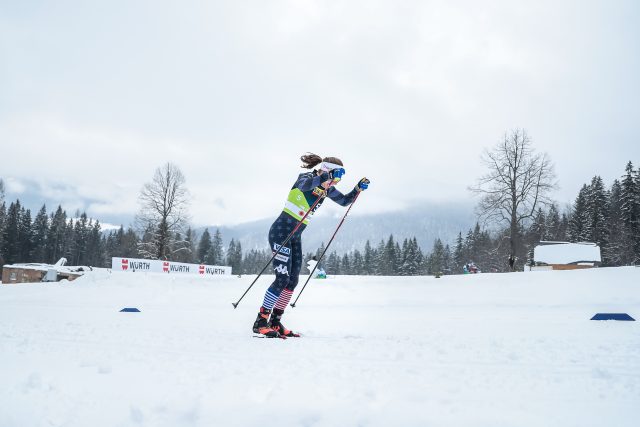
To start the second leg, Weng handed off to Astrid Oeyre Slind (NOR), who had less than a second lead over Ebba Andersson (SWE), and Kerttu Niskanen (FIN). Swirbul was 21 seconds off the lead when she handed off to Rosie Brennan. Katharina Hennig (GER) pushed to the front with Slind; they were setting the pace, and doing so at a brisk level. It was then that classic expert, Kerttu Niskanen (FIN), took the lead and pushed the pace, gracefully employing her textbook Classic technique. Meanwhile, Brennan continued to fall back, visibly slipping on the uphills. Drama ensued toward the end of the second lap when Hennig turned up the pace. When Andersson tried to match it, she stepped on her pole, breaking it. This mishap saw her drop to the back of the lead pack and cost her valuable energy and momentum.
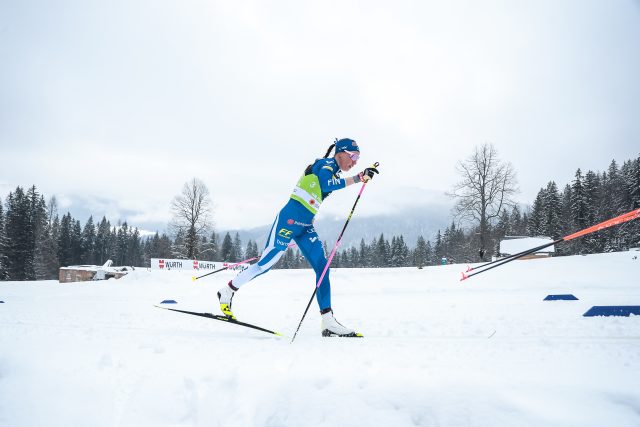
Though having already fallen out of medal contention, heartbreak struck again for Brennan: she slipped in the same spot where Andersson had slipped, stepped on her own pole as Andersson had done, and suffered the same demoralizing result: a broken pole. Two kilometers later, she had fallen 46 seconds behind the leaders, and the handwriting was on the wall for team USA. After the race, Brennan told FasterSkier that she didn’t have an explanation for what happened. She said that she didn’t feel the pole break affected her much. “I did it right in front of Matt [Whitcomb] and it was an uphill,” Brenan said. “I don’t think it was a deal-breaker for us today.” Jessie Diggins (USA) also expressed that she didn’t think the pole break made much difference in the big picture. “It was a good place to do it [break a pole],” she said.
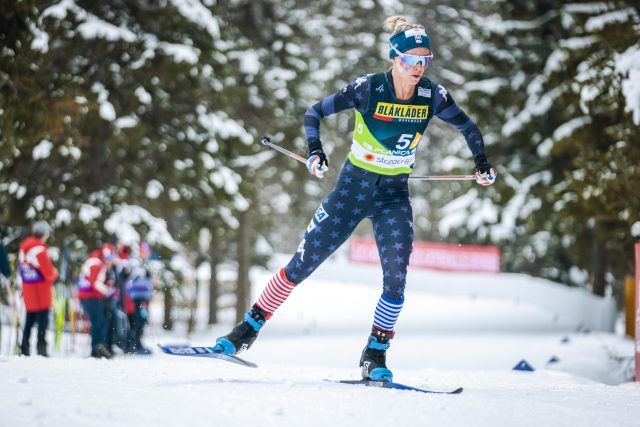
At the exchange into the third leg, Germany and Finland were locked in a dead heat. Norway and Sweden were a few seconds back in third and fourth, respectively. Jessie Diggins took the exchange 48 seconds behind the lead group and 43 seconds from a podium spot, a seemingly insurmountable gap to close in only five kilometers. In the lead group, Frida Karlsson (SWE) shot to the front; by the two kilometer mark she had nullified the leaders’ advantage and had thrust herself into first. But the push had proved costly, as Ingvild Flugstad Oestberg (NOR) then surged to the front and began to set an even faster pace. Oestberg’s acceleration shattered the lead pack with Finland’s Eveliina Piippo falling off the back. Karlsson began to fade and at 14.4 K dropped to third while Germany’s Pia Fink occupied second place.
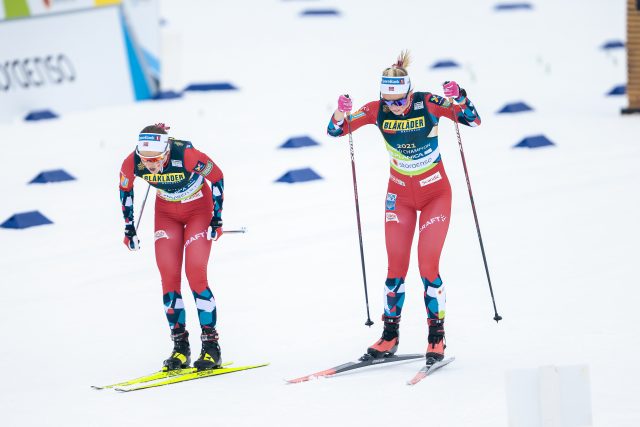
At the anchor leg exchange, Oestberg handed off in first to Anne Kjersti Kalvaa (NOR) with a 6.2 second advantage over Germany’s Victoria Carl and 14.9 seconds over Sweden’s Maja Dahlqvist. Diggins tagged Julia Kern (USA) almost 50 seconds behind the leader, and 35 seconds from third place. The Americans’ medal hopes were fading fast, and Kern was given the impossible task of needing to gain 35 seconds in five kilometers for a medal.
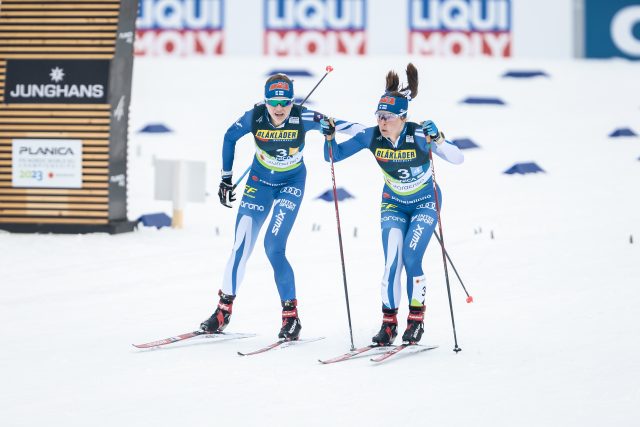
But at the front of the race things were being turned upside down as Krista Parmakoski (FIN) surged past Sweden’s Dahlqvist into third place. Unbelievably, at this point in the race, the star-studded Swedes were sitting off the podium. Norway’s Kalvaa continued to surge and at 19.4 k had stretched her lead to over 20 seconds, with Germany’s Carl comfortably in second. Finland’s Parmakoski was still in third with Sweden’s Dahlqvist sitting in fourth.
Kalvaa powered to the finish line taking the win for Norway. Carl took second for Germany. Dahlqvist put in a turn of pace in the last half kilometer to save face for Sweden, taking third. Finland was pushed back to fourth and USA finished fifth; 1:34 off the lead.
After the race, Swirbul talked to FasterSkier. “ It was an honor to have a spot on the team,” she said, placing some blame on herself for the team’s performance. “I knew I had a chance to give Rosie someone to ski with, and I really wanted to do that for her today and I didn’t make it happen…I blame myself for it.” She continued that she was prepared for the lead teams to break away early. “I found myself in a position I had hoped to not be in…suddenly you look up and there’s a gap, and it’s really hard to close that back.” Swirbul said that she, “was mentally prepared to really suffer…we know what’s possible…it will happen.”
Brennan told FasterSkier that, she saw Hailey trying to close the gap and was inspired by that. “I tried to harness some of that and find balance between skiing my own race and taking a chance.” Brennan added that “it’s definitely hard when you have four of the best skiers working together, and you’re alone.”
Diggins told FasterSkier’s Nat Herz that her plan was to “hope they weren’t [skiing] together in the front…Unfortunately, Ingvild went on a flyer…, if she hadn’t of done that… I think I was starting to make up time.” Diggins offered addtiional perspective on the potential of the American women’s team: “We know we’re there; we just need all the things to fit together and need a little bit of luck.” Diggins commenting on Swirbul’s lead leg said that, “You can’t put a relay on one person’s shoulders…it’s four people skiing it. Just like you can’t take all of the credit yourself, you can’t take all the blame yourself. I’m nothing but proud of how these girls skied.”
U.S. coach Chris Grover observed that, “the fact that you saw some of the best skiers in the world, like Frida at the edge, and Ebba at the edge tells you about the quality of the athletes that were competing,” said Grover. “We don’t have any podium finishers in Classic with any of our athletes…at the end of the day, we know we generally need to put our strongest skiers in legs two and three because that’s where the other teams are stacking up their big horsepower.” He also added that “the other teams know they can’t let off the gas, that this [Classic leg] is the place to put distance on USA.”
In a surprise, Grover also informed FasterSkier that Diggins would not race the 30 kilometer Classic race on Saturday. “Jessie is going to start to get ready for Holmenkollen,” he reported.
At the end of the day, Norway had redeemed itself in the fight for relay supremacy, and Germany proved it belonged at the top of the rankings. Sweden—a heavy pre-race favorite—had to satisfy itself with a third place finish. Team USA—a sentimental favorite with the fans—would have to watch the medal celebration from the sideline. High expectations would not be satisfied with a fifth place finish as the Americans would have to continue to search for the right formula to solve the relay riddle that still eludes them.
World Championship Women’s 4 x 5 Relays RESULTS
